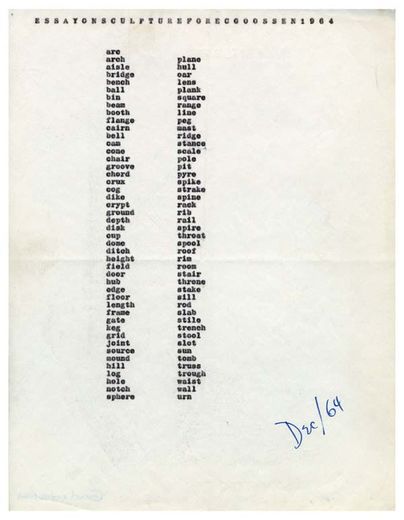User:Alice/Code Exercises: Difference between revisions
No edit summary |
No edit summary |
||
| Line 8: | Line 8: | ||
< | <source lang=python> | ||
for word in separated: | for word in separated: | ||
word = word.lower() + '\n' | word = word.lower() + '\n' | ||
</ | </source> | ||
| Line 18: | Line 18: | ||
< | <source lang=python> | ||
def test_seven(): | def test_seven(): | ||
assert seven('Baboons') == 'babushkas' | assert seven('Baboons') == 'babushkas' | ||
</ | </source> | ||
| Line 27: | Line 27: | ||
< | <source lang=python> | ||
def seven(sentence): | def seven(sentence): | ||
fpath = open('91K nouns.txt') | fpath = open('91K nouns.txt') | ||
| Line 57: | Line 57: | ||
assert seven('Baboons,') == 'babushkas' | assert seven('Baboons,') == 'babushkas' | ||
</ | </source> | ||
=== Python exercise inspired by the work of Carl Andre === | === Python exercise inspired by the work of Carl Andre === | ||
<gallery style="float:right;" mode=nolines widths=520px heights=520px> | |||
File:Andre-poems-18.jpg | |||
</gallery> | |||
I wrote a script that would turn a list of words of different lengths into a pattern similar to the one Carl Andre typed by hand with a typewriter. | |||
So far, all the tests pass. When receiving as input a long list of words, it raises a ValueError, which means it still needs debugging... | |||
<source lang=python> | |||
import pytest | |||
from math import ceil | |||
def grabber(words, numgrab): | |||
grabbedwords = [] | |||
for number in range(numgrab): | |||
grabbedwords.append(words.pop(0)) | |||
return (grabbedwords, words) | |||
def pattern(words, maxlength): | |||
goodwords = [] | |||
for word in words:right_one = ['a', 'aa', 'aaa', 'aa', 'a', 'b', 'bb', 'bbb', 'bb', 'b'] | |||
if len(word) <= maxlength: | |||
goodwords.append(word) | |||
items_pattern = maxlength + (maxlength -1) | |||
if len(goodwords) % items_pattern != 0: | |||
raise ValueError | |||
times = int(len(words) / items_pattern) | |||
final_pattern = [] | |||
for each_time in range(times): | |||
grabbed, whatisleft = grabber(goodwords, items_pattern) | |||
goodwords = whatisleft | |||
middle = ceil(len(grabbed)/2) | |||
sorted_pattern = ( | |||
sorted(grabbed[:middle]) + | |||
sorted(grabbed[middle:], reverse=True) | |||
) | |||
final_pattern.append(sorted_pattern) | |||
return final_pattern | |||
def test_pattern_returns_list(): | |||
assert type(pattern(['a', 'b', 'c', 'd', 'e'], 3)) == type([]) | |||
def test_pattern_removes_over_max_len(): | |||
right_one = [['a', 'aa', 'aaa', 'aa', 'a']] | |||
assert pattern(right_one[0] + ['aaaaa'], 3) == right_one | |||
def test_pattern_too_short_wont_work(): | |||
with pytest.raises(ValueError): | |||
pattern(['a', 'aa'], 3) | |||
def test_grabber(): | |||
assert grabber(['a', 'aaa'], 1) == (['a'], ['aaa']) | |||
def test_two_patterns(): | |||
right_one = ['a', 'aa', 'aaa', 'aa', 'a', 'b', 'bb', 'bbb', 'bb', 'b'] | |||
result = [['a', 'aa', 'aaa', 'aa', 'a'], ['b', 'bb', 'bbb', 'bb', 'b']] | |||
assert pattern(right_one, 3) == result | |||
</source> | |||
Revision as of 10:25, 28 January 2018
Oulipo exercise
Improved the N + 7 code we wrote in Prototyping, by debugging and adding some tests. Work in progress.
Improvements
Bug example: the for loop was skipping capitalized words, because it could not find them in the input file with nouns.
To fix, I added the lower method for strings to turn all text to lowercase.
for word in separated:
word = word.lower() + '\n'
To test it, I added a test.
def test_seven():
assert seven('Baboons') == 'babushkas'
Full script (in progress)
def seven(sentence):
fpath = open('91K nouns.txt')
nouns = fpath.readlines()
separated = sentence.split()
#print(separated)
new_separated = []
for word in separated:
word = word.lower() + '\n'
if word in nouns:
position = nouns.index(word)
new_word = nouns[position + 7]
#print(" replacing", new_position)
new_separated.append(new_word.strip())
else:
#print("notinlist")
#print("adding to new_separated ", word)
new_separated.append(word.strip())
#print(new_separated)
return ' '.join(new_separated)
#sentence = input('What is your sentence? ')
#seven(sentence)
# pytest requires that you name your tests with test_<your-name>
# run with the 'pytest' command in your terminal
def test_seven():
assert seven('Baboons') == 'babushkas'
assert seven('Baboons,') == 'babushkas'
Python exercise inspired by the work of Carl Andre
I wrote a script that would turn a list of words of different lengths into a pattern similar to the one Carl Andre typed by hand with a typewriter. So far, all the tests pass. When receiving as input a long list of words, it raises a ValueError, which means it still needs debugging...
import pytest
from math import ceil
def grabber(words, numgrab):
grabbedwords = []
for number in range(numgrab):
grabbedwords.append(words.pop(0))
return (grabbedwords, words)
def pattern(words, maxlength):
goodwords = []
for word in words:right_one = ['a', 'aa', 'aaa', 'aa', 'a', 'b', 'bb', 'bbb', 'bb', 'b']
if len(word) <= maxlength:
goodwords.append(word)
items_pattern = maxlength + (maxlength -1)
if len(goodwords) % items_pattern != 0:
raise ValueError
times = int(len(words) / items_pattern)
final_pattern = []
for each_time in range(times):
grabbed, whatisleft = grabber(goodwords, items_pattern)
goodwords = whatisleft
middle = ceil(len(grabbed)/2)
sorted_pattern = (
sorted(grabbed[:middle]) +
sorted(grabbed[middle:], reverse=True)
)
final_pattern.append(sorted_pattern)
return final_pattern
def test_pattern_returns_list():
assert type(pattern(['a', 'b', 'c', 'd', 'e'], 3)) == type([])
def test_pattern_removes_over_max_len():
right_one = [['a', 'aa', 'aaa', 'aa', 'a']]
assert pattern(right_one[0] + ['aaaaa'], 3) == right_one
def test_pattern_too_short_wont_work():
with pytest.raises(ValueError):
pattern(['a', 'aa'], 3)
def test_grabber():
assert grabber(['a', 'aaa'], 1) == (['a'], ['aaa'])
def test_two_patterns():
right_one = ['a', 'aa', 'aaa', 'aa', 'a', 'b', 'bb', 'bbb', 'bb', 'b']
result = [['a', 'aa', 'aaa', 'aa', 'a'], ['b', 'bb', 'bbb', 'bb', 'b']]
assert pattern(right_one, 3) == result

